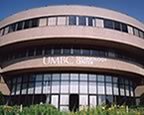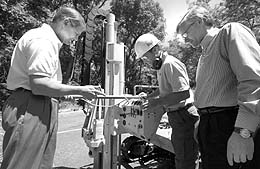|
||||||||||||||||||||||||||||||||||||
|
“We have broad appeal,” said Ned Tillman, president and co-founder. “Environmental types like us for our less invasive procedures, but businesses like us because we can save them a lot of money. We're in a pretty good position.” The 6-year-old company has found a clean and fast way to measure subsurface pollution. While giving the environmentally concerned reason to cheer, Columbia is doing its share to keep commerce, particularly the real estate market, humming. “Real estate transactions can close a lot faster now,” Tillman said. “Before, a lot of deals would fall apart because of the time it would take to find out if there was contamination on a property. With our technology you can know that in a day.” The Catonsville-based company is now entering a growth phase. After spending its first three to four years engaged mostly in research and product development, the company has experienced “significant growth” over the past two years, according to Tillman. Business is expected to increase 15 percent to 20 percent annually for the next several years. Columbia currently does about $2 million in annual revenue and is profitable, CEO and co-founder John Sohl said. Larger firms have approached Columbia about a possible buyout but the time isn't right for that yet, Tillman said. The possibility of becoming a publicly traded company is still years away, he said. Columbia's technology uses an MRI to determine if an area has below-surface pollution. The company does most of its work on land but has worked on water projects, such as the dredging of New York Harbor. The speed and detail of Columbia's work has enabled clients to save 40 percent to 60 percent on dredging costs, Sohl said. The much-discussed dredging of the Port of Baltimore could benefit from Columbia's technology, the CEO said. “Most inner harbor work is still done the old-fashioned way,” Sohl said. “But our technology can make a big difference in cleanup costs. When you're dealing with a large project, that's usually a significant amount of money.” Columbia's process is grounded in what it calls SmartData Solutions. The company uses sensors and high-definition pictures that post results to a secure Web site within a day. This substitutes for drilling rigs and sampling methods that can take weeks or months to produce results. The company is seeking five patents in the United States that will help secure its intellectual property, Sohl said. Sohl, a Florida native, graduated from the U.S. Naval Academy in 1972 with a bachelor's of science degree in engineering. He also has an MBA from Chaminade University in Hawaii. Tillman, a Towson native, is a registered geologist with a bachelor's degree from Franklin & Marshall College in Pennsylvania and a master's from Syracuse University in New York. The public will have an opportunity to see Columbia's technology in action later this month when the company does a presentation and demonstration at a National Ground Water Association conference at the Wyndham Baltimore Inner Harbor hotel in Baltimore City July 21 and 22. Although business is expanding, Columbia is still “working our way up the adoption curve,” according to Sohl. “People are slow to change,” Tillman said. “No matter how worthwhile a product you have, it takes time for people to discover it and begin using it.” Clients include major chemical companies such as Dow Chemical Co., DuPont Inc., and FMC Corp., as well as oil firms and the Department of Defense. The company has done work in most of the U.S. states and several foreign countries. It recently got contracts to do work in Africa and Chile, according to Tillman. Maryland-area work includes Baltimore's Camden Yards, the Chesapeake Bay watershed and the MCI Center in Washington. The Maryland Department of the Environment awarded Columbia a three-year contract in 2003 to do “direct-push” sampling of soil, water and soil gas. The year before that the company received a Maryland Innovative Technology Award from the state Department of Business and Economic Development. Columbia has also won kudos from the U.S. Environmental Protection Agency, Tillman said. Columbia grew out of the business incubator at the University of Maryland, Baltimore County. Several of the company's employees are UMBC graduates. The company's offices are located on the college's south campus. “It's important to recognize the role the state business development system had in our business and others,” Sohl said. “Maryland doesn't have a lot of technology companies by accident.” Columbia currently has about 14 full-time employees and is in the process of adding more, Tillman said. Chemists and geologists as well as people experienced in computer graphics and visualization are being sought. “Right now we're in the process of trying to meet the demand we've created,” Tillman said. |
|||||||||||||||||||||||||||||||||||
|
bwtech@UMBC Incubator and Accelerator• 1450 South Rolling Road • Baltimore, MD 21227 410.455.5900 • 410.455.5901 fax • techcenter@umbc.edu |
||||||||||||||||||||||||||||||||||||




